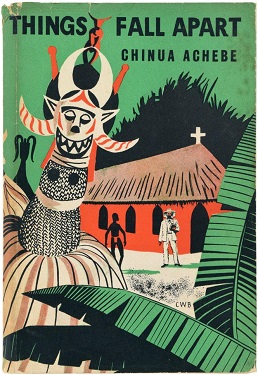
Things Fall Apart is a novel written by Nigerian author Chinua Achebe. Published in 1958, things Fall Apart chronicles pre-colonial life in the southeastern part of Nigeria and the arrival of the Europeans during the late nineteenth century. It is seen as the archetypal modern African novel in English, one of the first to receive global critical acclaim.
Author
Chinua Achebe, 16 November 1930 – 21 March 2013 was a Nigerian novelist, poet, professor, and critic. Raised by his parents in the Igbo town of Ogidi in southeastern Nigeria, Achebe excelled at school and won a scholarship to study medicine, but changed his studies to English literature at University College (now the University of Ibadan). He became fascinated with world religions and traditional African cultures and began writing stories as a university student. After graduation, he worked for the Nigerian Broadcasting Service (NBS) and soon moved to the metropolis of Lagos.
Archetype
Archetype Definition
In literature, an archetype is a typical character, an action, or a situation that seems to represent universal patterns of human nature.
An archetype, also known as “universal symbol,” maybe a character, a theme, a symbol, or even a setting. Many literary critics are of the opinion that archetypes – which have a common and recurring representation in a particular human culture, or entire human race – shape the structure and function of a literary work.
Carl Jung, the Swiss psychologist, argued that the root of an archetype is in the “collective unconscious” of mankind. The phrase “collective unconscious” refers to experiences shared by a race or culture. Such experiences include such things as love, religion, death, birth, life, struggle, and survival. These experiences exist in the subconscious of every individual and are re-created in literary works, or in other forms of art.
Example #1: The Hero
He or she is a character who predominantly exhibits goodness, and struggles against evil in order to restore harmony and justice to society.
Example #2: The Mother
Such a character may be represented as a Fairy God Mother, who guides and directs a child, Mother Earth, who contacts people and offers spiritual and emotional nourishment, or a Stepmother who treats their stepchildren poorly.
View count: 3766